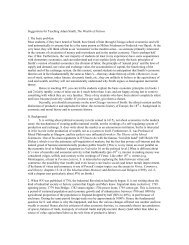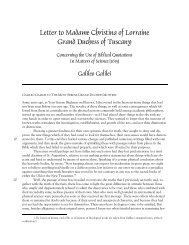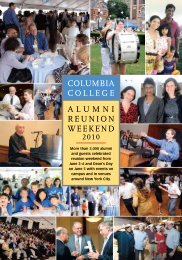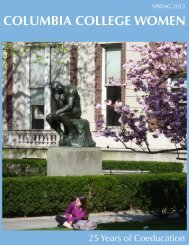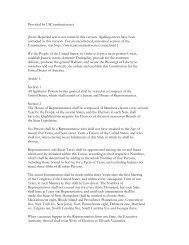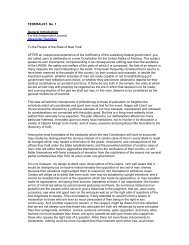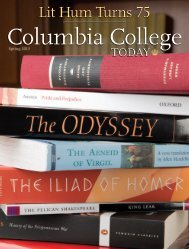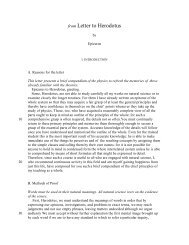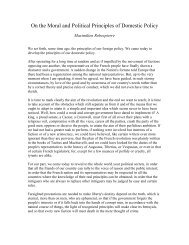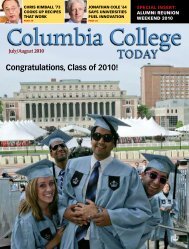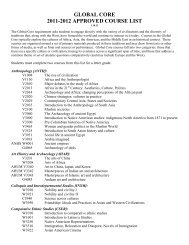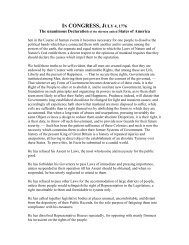A Passion for Science - Columbia College - Columbia University
A Passion for Science - Columbia College - Columbia University
A Passion for Science - Columbia College - Columbia University
You also want an ePaper? Increase the reach of your titles
YUMPU automatically turns print PDFs into web optimized ePapers that Google loves.
<strong>Columbia</strong> CollEgE Today CLASS NOTES<br />
Class notes<br />
25<br />
40<br />
<strong>Columbia</strong> <strong>College</strong> Today<br />
<strong>Columbia</strong> Alumni Center<br />
622 W. 113th St., MC 4530<br />
New York, NY 10025<br />
cct@columbia.edu<br />
howard n. Meyer ’34, ’36L, a retired<br />
New York lawyer and two-time<br />
Pulitzer Prize-nominated author,<br />
discussed challenges of immigration<br />
and civil rights in terms of the 14th<br />
Amendment. A product of the Civil<br />
War, the amendment made citizens<br />
equal be<strong>for</strong>e the law.<br />
Howard has written more than<br />
70 articles and books, and in his<br />
Pulitzer Prize-nominated book<br />
from 1973, The Amendment that<br />
Refused to Die: Equality and Justice<br />
Deferred: A History of the Fourteenth<br />
Amendment, he reflects on the<br />
beginnings and current significance<br />
of the amendment. Howard<br />
believes that because of new<br />
developments in the Arizona U.S.<br />
Senators’ attempts to repeal the<br />
14th Amendment, more specifically<br />
the effects the repeal would<br />
have on the children of Mexican<br />
nationals because their entrance<br />
into the country was not in accordance<br />
with the law, the nation<br />
will eliminate the rights of people,<br />
and people will begin to <strong>for</strong>get the<br />
importance of equality and justice<br />
values.<br />
Reading books such as Thomas<br />
Wentworth Higginson’s Army Life<br />
in a Black Regiment opened Howard’s<br />
eyes to the contributions of<br />
minorities such as women, African-<br />
Americans and other groups that<br />
have been omitted from textbooks<br />
in American history. Howard’s<br />
most recent book, The World Court<br />
in Action: Judging Among the Nations,<br />
was published in 2002 and also was<br />
nominated <strong>for</strong> the Pulitzer Prize. In<br />
it, he writes about the International<br />
Court of Justice and international<br />
law.<br />
Howard moved to Bolinas, Calif.,<br />
in 2009 to be closer to his sons, Jon-<br />
Class Notes are submitted by<br />
alumni and edited by volunteer<br />
class correspondents and the<br />
staff of CCT prior to publication.<br />
Opinions expressed are those of<br />
individual alumni and do not<br />
reflect the opinions of CCT, its<br />
class correspondents, the <strong>College</strong><br />
or the <strong>University</strong>.<br />
athon and Franklin. He continues to<br />
follow current events about justice<br />
and equality nationally and internationally.<br />
david perlman ’39, ’40J writes,<br />
“At 92, I’m still science editor of<br />
the San Francisco Chronicle, covering<br />
everything except medicine —<br />
anthropology, seismic goings-on,<br />
cosmic universes, planets and so<br />
on.” [Editor’s note: CCT profiled<br />
Perlman in November/December<br />
2009: college.columbia.edu/cct/<br />
nov_dec09.]<br />
41<br />
robert Zucker<br />
29 The Birches<br />
Roslyn, NY 11576<br />
rzucker@optonline.net<br />
Sad to report that Joe coffee, one<br />
of our most outstanding class<br />
members, passed away in January<br />
shortly after his 92nd birthday.<br />
Joe was our class president; voted<br />
most likely to succeed; a member<br />
of student board; a regular attendee,<br />
with his wife, Margaret, at our<br />
annual Arden House reunions; and<br />
a good friend. After graduation,<br />
he joined the Navy and served on<br />
the President’s staff, was executive<br />
officer on a destroyer escort that<br />
was sunk and then commanding<br />
officer of another destroyer escort.<br />
He was assistant to the president<br />
of <strong>Columbia</strong> and on its Board of<br />
Trustees. Joe was president of<br />
Eisenhower <strong>College</strong> and was the<br />
patriarch of a large and loving family.<br />
A memorial service was held at<br />
<strong>Columbia</strong> on April 28. [See March/<br />
April Obituaries.]<br />
On a happier note, I spent Christmas<br />
week in Costa Rica with Fran<br />
Katz’s family, where I zip-lined,<br />
white water rafted, kayaked and<br />
hiked in the rain<strong>for</strong>est, including<br />
five bouncing suspension bridges.<br />
In February I took my family of 26,<br />
including 12 great-grandchildren, to<br />
Club Med in Ixtapa, Mexico.<br />
Ken Hechler ’40 GSAS, my last<br />
instructor in college, stayed at my<br />
house <strong>for</strong> two nights and lectured<br />
on April 8 at the Roslyn Library<br />
and then at C.W. Post (LIU). He<br />
wrote the book (also was a movie)<br />
The Bridge at Remagen and many<br />
other publications, was a colonel<br />
in the army, a long-term (and still)<br />
college professor and was President<br />
Truman’s speechwriter and<br />
adviser. He was a congressman<br />
<strong>for</strong> 18 years, secretary of state in<br />
West Virginia, and still lectures<br />
and writes.<br />
Let me know what you are doing.<br />
42<br />
MAY/JUNE 2011<br />
43<br />
Melvin hershkowitz<br />
22 Northern Ave.<br />
Northampton, MA 01060<br />
DrMelvin23@gmail.com<br />
On January 14, The New York Times’<br />
obituary section carried a memorial<br />
tribute to franklin gerald bishop<br />
’43E, who died on January 14, 1996.<br />
Gerry’s widow, Evelyn, has faithfully<br />
published this annual tribute<br />
to Gerry since he succumbed to<br />
his final illness 15 years ago. This<br />
writer met Gerry at a freshman beer<br />
party in September 1938 in John Jay<br />
Hall, where we gathered around a<br />
piano to sing raunchy limericks and<br />
Roar, Lion, Roar. Gerry later became<br />
a good friend. He was a brilliant<br />
mathematician and engineer. He<br />
had a successful career as an engineer<br />
and management consultant,<br />
and finally as CEO and president<br />
of Matrix Corp. At our Homecoming<br />
football game in 1995, Gerry<br />
came up to the Remmer-Maniatty<br />
Alumni Lounge above Wien Stadium<br />
in his wheelchair to watch the<br />
game and visit with classmates. He<br />
already was very ill but perfectly<br />
alert and able to converse with us.<br />
That was the last time I saw him. At<br />
<strong>Columbia</strong>, Gerry was Dean’s Day<br />
chairman, and a generous financial<br />
supporter of the <strong>College</strong>, a tradition<br />
that Evelyn has continued through<br />
the years. We join Evelyn in remembering<br />
Gerry’s impressive professional<br />
accomplishments and his<br />
lifelong devotion to <strong>Columbia</strong>.<br />
The New York Times of January 24<br />
reported the death of clarence<br />
Eich ’43E on January 8. After WWII<br />
service in the Navy, he was a mechanical<br />
engineer at Combustion En-<br />
gineering. In 1962, Clarence joined<br />
the Foster Wheeler Corp., where he<br />
was issued several patents <strong>for</strong> new<br />
designs and products <strong>for</strong> power<br />
generation and rose to the position<br />
of e.v.p. be<strong>for</strong>e his retirement in 1984.<br />
At <strong>Columbia</strong>, Clarence was an active<br />
and widely respected classmate.<br />
He was a member of Sigma Alpha<br />
Epsilon, the Glee Club, the Van Am<br />
Society and the Debate Council. He<br />
earned silver and gold crowns, and<br />
was elected to Nacoms. He attended<br />
all of our significant landmark<br />
reunions and our Homecoming<br />
games at Wien Stadium. After his<br />
retirement, Clarence traveled widely<br />
with his wife, Ellen, enjoyed his golf<br />
games and was a skilled gardener.<br />
He won awards <strong>for</strong> his flowers and<br />
developed several new varieties of<br />
gesneriads. In 2001, Clarence was<br />
named Volunteer of the Year by the<br />
State of New Jersey Division of Parks<br />
and Forestry <strong>for</strong> his work on behalf<br />
of the Canal Society. He is survived<br />
by his wife; children, Mary, Robert<br />
and Claire; two grandchildren; and<br />
two great-grandchildren. We mourn<br />
the loss of such a distinguished<br />
classmate, and we extend our condolences<br />
to his family.<br />
The annual Dean’s Scholarship<br />
Reception, honoring donors to<br />
named scholarships, was held in Alfred<br />
Lerner Hall on February 3. Two<br />
of the finest members of our Great<br />
Class of 1942 are honored in perpetuity<br />
by memorial scholarships:<br />
charles f. “chic” hoelzer Jr. and<br />
Dr. herbert Mark. The Hoelzer memorial<br />
scholarship was established<br />
in 1978, the year of his untimely<br />
death, by this correspondent and<br />
Chic’s widow, the late Dorothy. The<br />
Mark memorial scholarship was established<br />
by Herb’s widow, Avra ’45<br />
Barnard; his sons, Peter, Tom and<br />
Jeremy; his cousin, Reuben Mark;<br />
and this correspondent after Herb’s<br />
death in 2006. In 1939–40, Herb<br />
was my Livingston Hall roommate,<br />
and thanks to <strong>Columbia</strong>, became<br />
my friend <strong>for</strong> 67 years. I encourage<br />
classmates who remember Chic and<br />
Herb to contribute to their memorial<br />
scholarship funds. Please contact<br />
the <strong>Columbia</strong> <strong>College</strong> Fund’s<br />
Eleanor L. Coufos ’03, director of<br />
annual giving programs, at 212-851-<br />
7483 <strong>for</strong> further in<strong>for</strong>mation.<br />
I was sad to receive notice from<br />
our Alumni Office on February<br />
19 that werner rahmlow died in<br />
Camden, Maine, on January 3. In<br />
April 2009, Werner sent me a long<br />
autobiographical letter from his<br />
winter residence in Lady Lake, Fla.,<br />
including reminiscences about his<br />
years at <strong>Columbia</strong>. Like <strong>Columbia</strong>’s<br />
most generous financial supporter,<br />
the late John W. Kluge ’37, Werner<br />
was born in Germany; he emigrated<br />
to the United States in 1932<br />
and became a U.S. citizen in 1942.<br />
He settled in Leonia, N.J., where<br />
he attended the local high school.<br />
Werner’s high school principal<br />
took him to the <strong>Columbia</strong> campus<br />
<strong>for</strong> a personal visit (could that ever<br />
happen today?), and Werner was<br />
eventually admitted with a full<br />
scholarship to study engineering.<br />
He commuted to the campus by<br />
trolley, 125th Street ferry, subway<br />
and on foot <strong>for</strong> three hours daily,<br />
five or six days each week, and still<br />
found the time to train and run<br />
<strong>for</strong> <strong>Columbia</strong> under track coach<br />
“Canny Carl” Merner (Werner had<br />
been an undefeated half-miler in<br />
high school). With his demanding<br />
engineering studies and long com-



